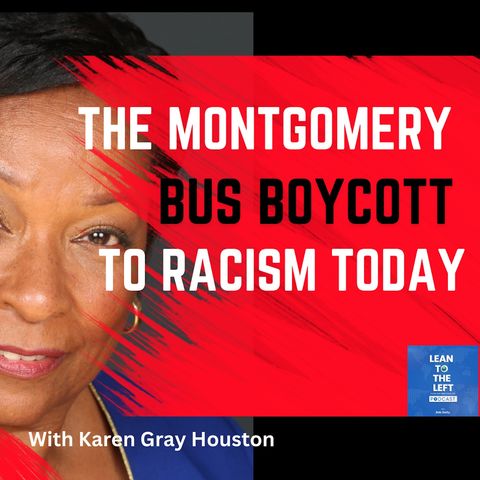Has There Been Progress on Racism Since the Montgomery Bus Boycott?

Sign up for free
Listen to this episode and many more. Enjoy the best podcasts on Spreaker!
Download and listen anywhere
Download your favorite episodes and enjoy them, wherever you are! Sign up or log in now to access offline listening.
Has There Been Progress on Racism Since the Montgomery Bus Boycott?
This is an automatically generated transcript. Please note that complete accuracy is not guaranteed.
Description
It was 73 years ago in 1950 that a Black man named Hillard Brooks was shot and killed by a White police officer after he tried to board a city...
show moreThomas Gray, who had played football with Brooks as a kid, was outraged by the tragic, unjustifiable shooting. He protested and eventually staged a downtown march to register voters and protest police brutality.
Five years later Gray led another protest against the city’s segregated buses. On the front lines of the Montgomery bus boycott, Gray withstood threats and bombings alongside his brother, Fred D. Gray, a young lawyer who represented Martin Luther King Jr., Rosa Parks, and Claudette Colvin, a plaintiff in the case that forced Alabama to desegregate its buses.
I’m thrilled today that we have with us Thomas Gray’s daughter, Karen Gray Houston, an award winning broadcast journalist, who has written a captivating memoir, “Daughter of the Boycott, Carrying on a Montgomery Family’s Civil Rights Legacy.” It’s an incredible story that recounts how her father’s and uncle’s actions changed the nation’s racial climate and opened doors for her and other African Americans.
Karen Gray Houston was born in Montgomery, Alabama, raised in Cleveland, Ohio. She spent 41 years as a news reporter and anchor at radio and television stations and networks in Boston, New York City, and Washington, DC. Since retiring, she wrote Daughter of the Boycott, which was featured in an edition of Oprah's O magazine as "One of 10 Titles to Pick Up Now" and in Smithsonian Magazine's Book of the Week series.
Here are some key points we discussed with her:
Q. To start with, please tell us why you wrote the book and what’s happened since then. I understand that both your uncle and father have been honored and there was some good news for Claudette Colvin, as well.
Q. We’re in mid-December now. That’s a month that’s had a lot of significance in this overall story, right?
Q. Can you walk us through some of the key components of your book?
Q. The role of Claudette Colvin isn ‘t as well-known as Rosa Parks, for example, but this teenage girl was very brave and played a very important role in the battle for racial equality. Tell us about that.
Q. In your book you recount the days of the boycott, not only what happened, but how it affected your family. Can you tell us about that?Q. In the chapter about Dr. King’s house being bombed, you write that your parents wrapped you in “a protective cocoon,” sheltering you from “unpleasantness associated with the bus boycott.” What was that like for you as a young child?
Q. You write about carpools that were created to provide Blacks boycotting the buses with transportation. Your dad was part of that, right? Tell us about that.Q. You weren’t the only member of your family on the radio, as your dad had a show called “Songs of the Southland.” Tell us about that and how it may have affected you and your career choice.
Q. Tell us about your own broadcast career…You were on WTOP Radio in Washington, DC, to which I was addicted when I worked on Capitol Hill. And you were with United Press International for a time. I worked at UPI early in my career, as well.
Q. During your career, did you have to cope with discrimination and anti-Black prejudice? How did that affect you? How did you cope with it?
Q. What are your thoughts about racism in the U.S. today and efforts by some on the political right to rewrite history, even to the point of claiming that somehow slavery was a positive experience for some Negroes?
Q. As we look towards the coming 2024 presidential election, what are your thoughts about race relations in America, President Biden, Donald Trump and the rest of the Republican presidential wannabes?
Q. Your father’s initial bus protest was prompted by the unjustified shooting of a black man by a white police officer. We have seen all too many similar shootings occur in recent years prompting calls for police reform, including the controversial call to “defund the police”. What are your thoughts about this?
Q. How can people reach out to you and where can they find your book?
Q. What’s next for you?
Information
Copyright 2024 - Spreaker Inc. an iHeartMedia Company
